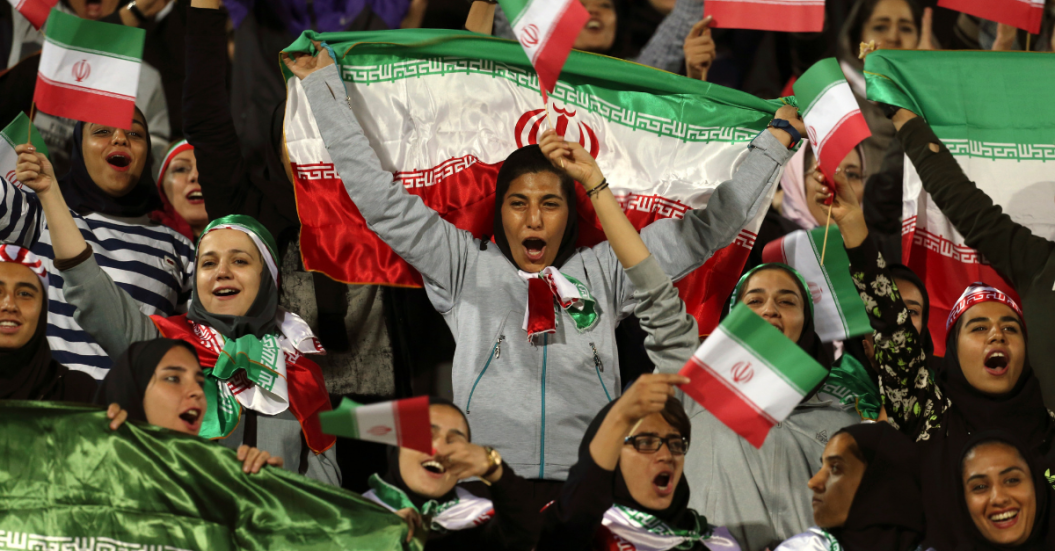DUBAI, United Arab Emirates (AP) — An Iranian woman detained for dressing as a man to sneak into a soccer stadium to watch a match has died after setting herself on fire upon learning she could spend six months in prison, semi-official news outlets reported Tuesday.
Videos by FanBuzz
The self-immolation death of 29-year-old Sahar Khodayari has shocked Iranian officials and the public, becoming an immediate hashtag trend across social media in the Islamic Republic.
https://twitter.com/AP_Sports/status/1171422901490393088
It also comes as FIFA is working with Iranian authorities to overcome a ban on women entering stadiums for men's games, a ban in place since the country's 1979 Islamic Revolution. FIFA wants the issue resolved before Oct. 10 when Iran — the top-ranked team in Asia — hosts its first home World Cup qualifier against Cambodia.
FIFA said Tuesday it was "aware of that tragedy and deeply regret it."
"FIFA convey our condolences to the family and friends of Sahar and reiterate our calls on the Iranian authorities to ensure the freedom and safety of any women engaged in this legitimate fight to end the stadium ban for women in Iran," FIFA said in a statement.
Khodayari died on Monday at a Tehran hospital after suffering burns across 90% of her body. She had been on a respirator since dousing herself with gasoline in front of Tehran's Ershad Courthouse on Sept. 2, according to the Iranian news website Rokna, which publishes in Iran with government permission.
She had just learned she could be tried by a Revolutionary Court in Iran and be put in prison for six months, her father told the website.
https://twitter.com/AlinejadMasih/status/1171430367959506946
Khodayari's sister told Iran's pro-reform Shahrvand newspaper that her sister suffered from bipolar disorder. Her father said she had stopped taking medication a year ago.
Prominent lawmaker Ali Motahari, who is close to Iran's relatively moderate President Hassan Rouhani, tweeted that Khodayari didn't deserve prison time and offering her "some advice" would have been enough.
In March, Khodayari tried to sneak into Tehran's Azadi Stadium to watch her favorite team, Esteghlal, take on the United Arab Emirates team Al Ain. As in other matches, she disguised herself as a man by wearing a blue wig and a long overcoat, gaining the nickname the "Blue Girl." However, police arrested her after an altercation and detained her.
She spent three nights in jail before being released pending the court case. She reportedly returned to the court to retrieve her seized mobile phone and heard she could face prison time.
News of her death ricocheted across Iran on Tuesday, with tributes hashtagged "BlueGirl."
Former Bayern Munich midfielder Ali Karimi — who played 127 matches for Iran and has been a vocal advocate of ending the ban on women — urged Iranians in a tweet to boycott soccer stadiums to protest Khodayari's death.
Iranian-Armenian soccer player Andranik "Ando" Teymourian, the first Christian to be the captain of Iran's national squad and also an Esteghlal player, said in a tweet that one of Tehran's major soccer stadiums should be named after Khodayari "in the future."
Female lawmaker Parvaneh Salahshouri called Khodayari "Iran's Girl" and tweeted: "We are all responsible."
https://twitter.com/ASRomaEN/status/1171405632118935554
There was no report on Khodayari's death from Iranian state media, nor its prominent semi-official news agencies. The conservative Shafaqna news agency acknowledged her death in a brief item Tuesday, noting that the case had drawn international attention and caused "counterrevolutionary media" to cry over the case.
FIFA has been trying to push Iran to allow women in for matches. A partial exception came in November when hundreds of Iranian women, who were separated from male supporters, were allowed into the Azadi Stadium in Tehran to watch the Asian Champions League final.
However, local matches have continued the restriction. Volleyball, another popular sport, similarly sees officials bar women from attending men's games in the capital, Tehran, though women were allowed in some matches in other Iranian cities.
Hard-liners and traditional Shiite clerics, citing their own interpretation of Islamic law, believe in segregating men and women at public events, as well as keeping women out of men's sports.
However, that has drawn criticism from human rights activists abroad, as well as at home.
"The stadium ban is not written into law or regulation but is ruthlessly enforced by the country's authorities," wrote Mindy Worden, the director of global initiatives at Human Rights Watch.
She added that Khodayari's suicide underscores "the need for Iran to end its ban on women attending sports matches — and the urgency for regulating bodies like FIFA to enforce its own human rights rules."
Amnesty International separately said that as far as it knows, "Iran is the only country in the world that stops and punishes women" seeking to enter soccer stadiums. Saudi Arabia, a longtime holdout, recently started allowing women to attend matches under a push from Crown Prince Mohammed bin Salman.
"What happened to Sahar Khodayari is heart-breaking and exposes the impact of the Iranian authorities' appalling contempt for women's rights in the country," said Philip Luther, Amnesty's Middle East and North Africa research and advocacy director.
"Her only 'crime' was being a woman in a country where women face discrimination that is entrenched in law and plays out in the most horrific ways imaginable in every area of their lives, even sports," Luther added.
